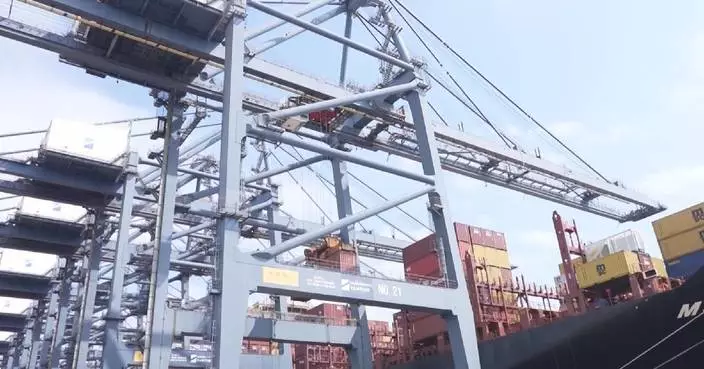The U.S. tariffs will seriously disrupt interconnected global supply chains, causing significant losses for manufacturers and consumers, said Hildegard Mueller, president of the German Association of the Automotive Industry (VDA), who is calling for solutions through negotiations.
China and the United States are among the German auto industry's largest markets outside the European Union. German car brands continue to have a significant presence at this year's Shanghai Auto Show. On the sidelines of the event, CGTN had an exclusive interview with the VDA president to discuss the potential impact of U.S. tariffs on the automotive sector and beyond.
Mueller warned that the policy would not only harm German manufacturers and suppliers but also drive up costs for American consumers, ultimately weakening the U.S. economy.
"Yes, the U.S. tariffs will have a negative impact on global trade. German manufacturers and suppliers will be affected. More than 80 percent of member companies report negative consequences. The tariff policy will have a significant impact on the U.S. as well. It will drive prices up for consumers, meaning the U.S. economy will suffer," she said.
Mueller believed that the sweeping U.S. levies will ultimately be detrimental to all parties in the interconnected global market, expressing concern over the rising tensions between the world's two largest economies.
"We have open markets and rely on this interconnectedness to thrive. We have optimized and coordinated supply chains. In the end, tariffs only lead to losses for all parties. That is why we need to return to the topic of global trade. Of course, we are also concerned about escalating tension between China and the United States," she said.
When asked about U.S. President Donald Trump's stance on tariffs—describing his position as flexible but unchanging—Mueller acknowledged the difficulty businesses face in navigating such uncertainty, stressing the importance of negotiations to weather the challenges.
"Yes, this is difficult for the entire economy.You can see how volatile the stock market has become, with European companies and American firms suffering equally. Naturally, this back-and-forth makes it very hard for businesses to respond to ongoing developments with legal certainty. You can't change supply relationships overnight. It takes time. This will undoubtedly have negative consequences for all parties involved. Therefore, we hope to find a solution through negotiations," said the VDA president.
The German government has sharply downgraded its economic outlook for 2025 and is now projecting zero growth. A report published Thursday cited U.S. tariffs as a major headwind, particularly the 25-percent levy on car imports, which threatens to severely weaken Germany's automotive industry. It estimated that these car duties could reduce German GDP by 0.1 percent in both 2025 and 2026.

US tariffs to inflict losses on all parties involved: German car industry association

US tariffs to inflict losses on all parties involved: German car industry association





















































